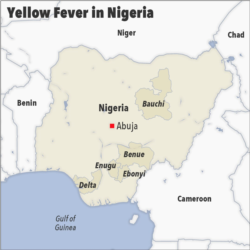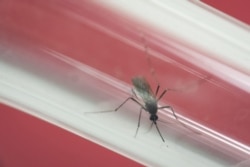A Nigerian yellow fever outbreak detected early last month is worsening and causing many cases and deaths across five of the country’s 36 states. The World Health Organization says 530 suspected cases, including 172 deaths, have been reported in Delta, Enugu, Benue and Ebonyi states in southern Nigeria and Bauchi in the north.
Bringing this epidemic under control is difficult because Nigeria is facing
many simultaneous outbreaks of other infectious diseases, including Lassa fever, vaccine-derived polio virus, measles, monkey pox and cholera.
World Health Organization spokesman Tarik Jasarevic says the northeast of the country is also facing a humanitarian crisis largely caused by Boko Haram militants.
“The response is particularly challenging in a COVID-19 context because it requires an extraordinary amount of time and resources from the country’s health system," said Jasarevic. "...National and state authorities are currently focused on the COVID-19 pandemic response, limiting the human resources required to conduct investigations and response activities for the yellow fever outbreaks.”
Nigeria has been battling successive yellow fever outbreaks since 2017. The deadly disease is caused by a virus spread through the bite of infected Aedes aegypti mosquitos, which bite during the day. Jasarevic says vaccination is of key importance in preventing outbreaks in high-risk countries.
“In Nigeria, these efforts are based on the introduction of the yellow fever vaccine into the routine immunization program," said Jasarevic. "This started in 2004, and also carrying preventive campaigns to rapidly increase protection. But still the population, entire population of Nigeria has not been protected.”
The World Health Organization urges those in areas reporting yellow fever to avoid daytime mosquito bites, keep their home surroundings clean, and clear mosquito breeding areas. It also recommends that anyone visiting Nigeria who is at least 9 months old be vaccinated against yellow fever.






